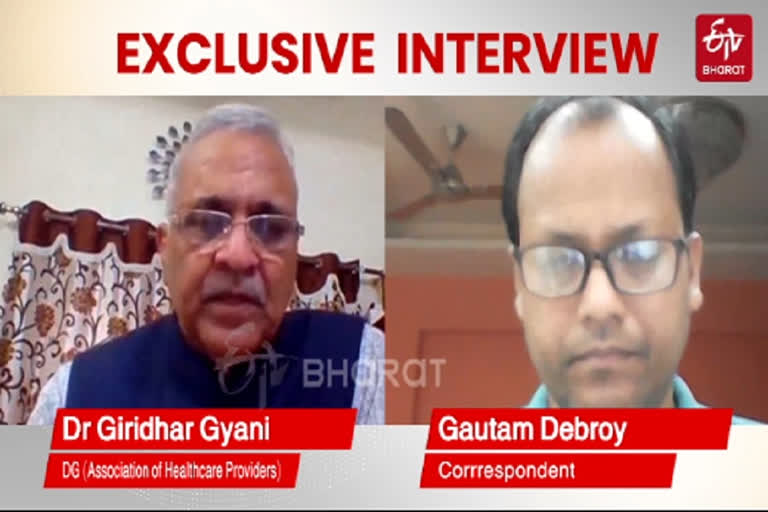New Delhi: As states like Bihar, Uttar Pradesh, Jharkhand, West Bengal and many others have been witnessing a large number of Covid-19 cases, senior health expert Dr Giridhar Gyani has told ETV Bharat that the pandemic scenario of these states have exposed the poor state of affairs in the health sector.
“These states were underdeveloped in respect of the health sector right from the beginning. If you want to do more testing you need a greater number of labs. And this lab should have accreditation. It’s a fact that the shortage of lab is a problem in India. And going by the present situation, we must have understood that we have neglected our health system for a long time,” said Dr Gyani who is also the director-general of the Association of Healthcare Providers.
Health expert Dr Giridhar Gyani while speaking to ETV Bharat India at present has 1,470 COVID testing laboratories including 501 private labs.
Dr Gyani said that Bihar, UP, Odisha and West Bengal are lacking in comparison to some other states like Karnataka, Tamil Nadu, Telangana.
“They (Southern states) have got more than 50 medical colleges in each state. But UP, Bihar, even MP have a smaller number of medical colleges maybe around 13 or 15. When students get admission in southern states, maximum students will never go back to their states like Bihar, UP and others. And when you don’t have a doctor’s who will be interested in setting up laboratories and hospitals...Nobody will invest. So, you will find that states like Karnataka, Telangana, and even Maharastra are at present in a good condition, because they have got the good medical infrastructure,” said Dr Gyani.
It may be mentioned here that spike in COVID cases in states like UP, Bihar, MP, West Bengal, Chhattisgarh have raised concern for the central government as well.
The Health Ministry said that as many as 10 states including UP, Bihar, MP, West Bengal, Chhattisgarh carry the 80 per cent COVID positive caseload in India.
Referring to the opening of school and educational institutions, Dr Gyani said that the opening of school and educational institutions are a sensitive matter.
“Although we are witnessing a very limited number of cases among the children, once the child goes to school, we will have no control. There are 50 children in one class it will be very difficult to control,” said Dr Gyani.
He said that schools and educational institutions should install ultraviolet (UV) machines to disinfect the classrooms. Countries across the globe are using light strike robots to disinfect large areas using UV light, as UV rays are used as a form of disinfectant and have a range of 200 to 300 nanometres.
He said that schools and colleges are doing good as far as online classes are concerned, “but it's problematic for kindergarten and other play schools, as they need physical appearance of the students.”
Also Read: Electric multicooker an easy, efficient way to sanitize N95 respirator masks, study finds
Referring to the coronavirus vaccine, Dr Gyani said that India will definitely play a big role in regard to the manufacture of the vaccine.
“Indian vaccine has not yet reached the third stage. They are still on stage I and II stage. But what is encouraging is that our pharma industry has tied up with Oxford and other Universities. “Even we are trying to manufacture Russian vaccines in our own country. So, whosoever develops a vaccine, they have to tie up with Indian pharma company for mass manufacturing,” said Dr Gyani.
When asked whether India has started witnessing of Covid-19 peak or it is yet to come, Dr Gyani said, “To say whether India witnessed peak or it is yet to come is very difficult. But yes, when we have started doing one million tests per day, say after one week we can say in which direction we are going.”
India is doing almost 1 million tests per day. “India is doing the highest number of COVID tests after the USA. When you increase testing, the number of cases will also increase. What is significant on our part is that we have decided to do quarantine of our people at home. The home quarantine has helped us a lot as it helps in increasing the number of hospital beds. And as we are tracing patients at the right time and admitting them in the hospital with oxygen and all other requirements, it is helping us in decreasing the fatality rate,” he said.
Dr Gyani, however, hailed India’s lowest COVID fatality rate. “Our fatality rate has come down to less than two per cent. And overall recovery is also more than 73 per cent. These two things are very encouraging. If you see, the USA's recovery rate is 53 per cent. In this way, we are doing very well. Except for the number of cases which is increasing every day by 50-60 thousand,” said Dr Gyani.
“What we required now is following proper health protocol,” said Dr Gyani.
Also Read: 'One nation one health card': PM Modi announces National Digital Health Mission
